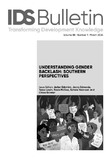Disrupting Anxious Masculinity: Fraternity as Resistance
| dc.contributor.author | Das, Abhijit | |
| dc.contributor.author | Dasgupta, Jashodhara | |
| dc.contributor.author | Mukhopadhyay, Maitrayee | |
| dc.contributor.author | Contractor, Sana Qais | |
| dc.contributor.author | Singh , Satish Kumar | |
| dc.coverage.spatial | India | en |
| dc.date.accessioned | 2024-02-28T15:11:06Z | |
| dc.date.available | 2024-02-28T15:11:06Z | |
| dc.date.issued | 2024-02-26 | |
| dc.identifier.citation | Das, A.; Dasgupta, J.; Mukhopadhyay, M.; Contractor, S. and Singh, S.K. (2024) 'Disrupting Anxious Masculinity: Fraternity as Resistance', IDS Bulletin 55.1: 85–100, DOI: 10.19088/1968-2024.108 | en |
| dc.identifier.issn | 1759-5436 | |
| dc.identifier.uri | https://opendocs.ids.ac.uk/opendocs/handle/20.500.12413/18248 | |
| dc.description.abstract | Within the experience of our work in India, context and positionality determine what we perceive as backlash against gender justice. An important underlying cause of backlash today is the widespread crisis of masculinities, where subaltern masculinities are evolving differently in response to the aggressive nationalist Hindutva masculinity. Gender and development strategies have failed to recognise or address this. This article analyses grounded examples from our action research towards generating new knowledge on how two collectives are negotiating backlash. These include the community-based transgender organisation Kolkata Rista and Humqadam, a platform comprising male activists in Uttar Pradesh working with men on gender equality. Applying the framework of ontological insecurity, this article explores ways for discovering common ground in situations where polarisation destroys the space for debate and discussion. Reflecting on the political practice of fraternity, the article examines how social movements can shift strategies when faced with exclusionary discourses. | en |
| dc.description.sponsorship | Swedish International Development Cooperation Agency (Sida) | en |
| dc.language.iso | en | en |
| dc.publisher | Institute of Development Studies | en |
| dc.relation.ispartofseries | IDS Bulletin;55.1 | |
| dc.rights | This is an Open Access article distributed under the terms of the Creative Commons Attribution 4.0 International licence (CC BY), which permits unrestricted use, distribution, and reproduction in any medium, provided the original authors and source are credited and any modifications or adaptations are indicated. | en |
| dc.rights.uri | http://creativecommons.org/licenses/by/4.0/ | en |
| dc.subject | Gender | en |
| dc.subject | Participation | en |
| dc.subject | Politics and Power | en |
| dc.title | Disrupting Anxious Masculinity: Fraternity as Resistance | en |
| dc.type | Article | en |
| dc.rights.holder | Institute of Development Studies | en |
| dc.identifier.team | Power and Popular Politics | en |
| dc.identifier.doi | 10.19088/1968-2024.108 | |
| dcterms.dateAccepted | 2024-02-26 | |
| rioxxterms.funder | Default funder | en |
| rioxxterms.identifier.project | Default project | en |
| rioxxterms.version | VoR | en |
| rioxxterms.versionofrecord | 10.19088/1968-2024.108 | en |
| rioxxterms.funder.project | e4b8632d-62dd-4f31-9936-43860ac26f9a | en |
Files in this item
This item appears in the following Collection(s)
Except where otherwise noted, this item's license is described as This is an Open Access article distributed under the terms of the Creative Commons Attribution 4.0 International licence (CC BY), which permits unrestricted use, distribution, and reproduction in any medium, provided the original authors and source are credited and any modifications or adaptations are indicated.


